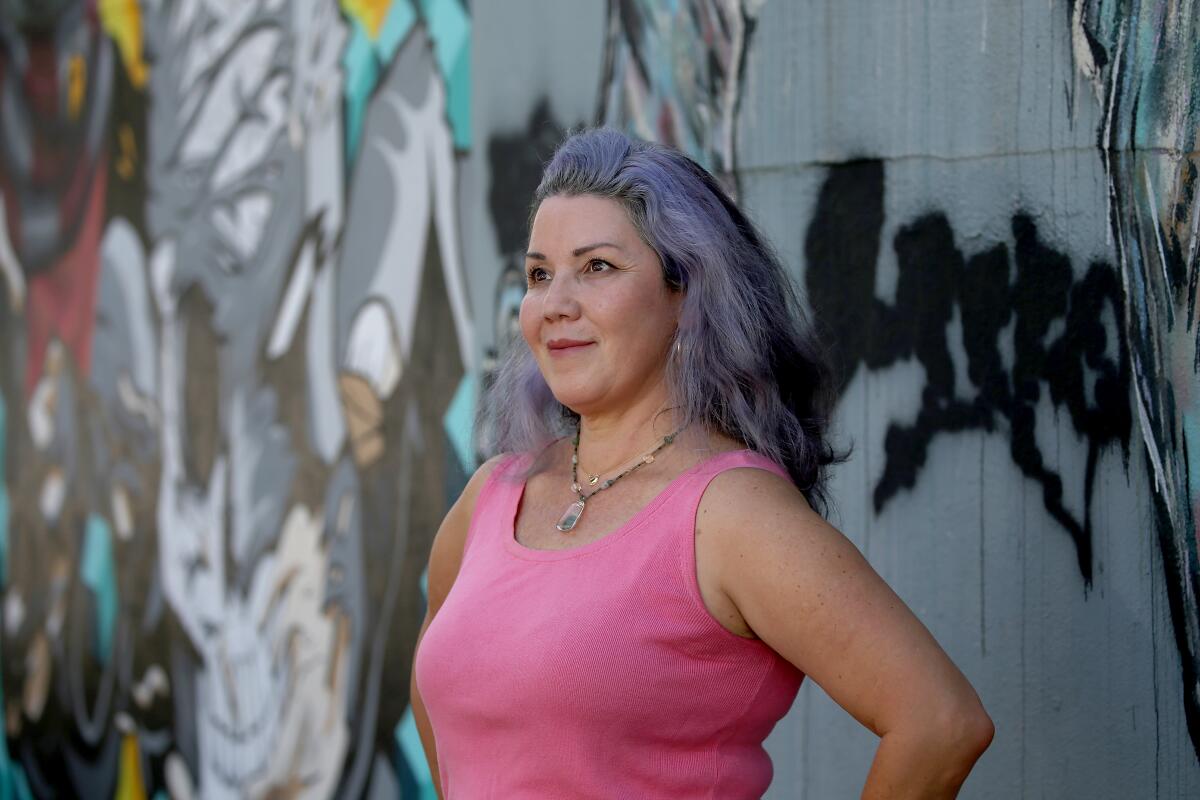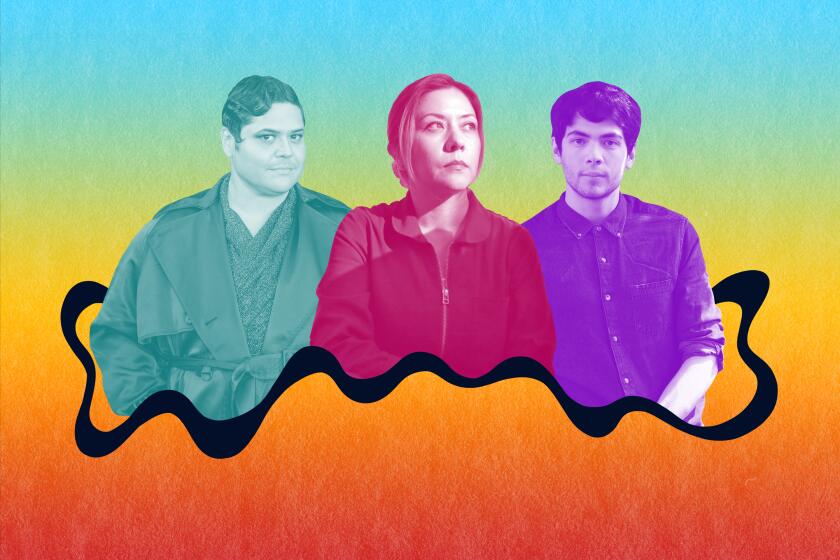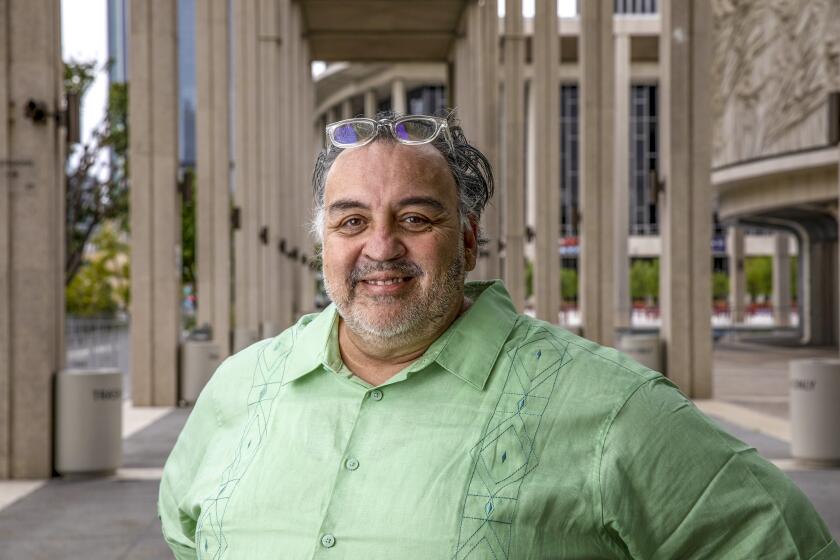Diana Burbano, a Colombian immigrant and punk rock playwright, is always true to herself

- Share via
The playwright Diana Burbano immigrated from Colombia to Cleveland with her family when she was 3 years old, then they moved to San Jose when she was 9. It wasn’t easy, and Burbano struggled in school. “I went to seven or eight schools because I couldn’t hack it at any of them,” she says. “One of the things they said was that I didn’t write.”
That’s because she couldn’t, Burbano says. Not by hand. She credits her eventual life in letters to the laptop’s autocorrect function. “It changed my life because I didn’t have to be ashamed of what I was writing,” she says while sitting on the patio of her Long Beach apartment, seagulls cawing in the distance.
After years of acting (Burbano is classically trained, including a stint in London), she began penning plays in her 30s. Writing her own material served as a corrective to her lived experience of playing what she refers to as the “hot tamale” parts: Anita in “West Side Story” or Bianca in “Kiss Me, Kate.”
“This is really not me,” Burbano remembers thinking of those tokenized roles — roles that suggest that Latinx culture is a monolith to be boiled down to a singular essence: what it means to be brown in the world. As if there’s just one answer to that. After that, Burbano began to write for herself.
We’ve heard so much talk about diversity. And yet, where are the Latinos? Open the talent pipeline — and lift up those who’ve fought their way in.
One of her earliest pieces centered on the Cuban-born artist Ana Mendieta, who created cathartic work using natural materials including mud, grass and blood, and died at 36 after falling from her 34th-floor apartment in Greenwich Village. Sculptor Carl Andre, her husband, was accused of pushing Mendieta out the window; he was later acquitted. “I don’t think she’s ever gotten her due, and he’s still living in the same apartment,” Burbano says. The experience also made Burbano realize that she enjoyed writing plays more than acting in them.
The Bay Area’s Alter Theater, a champion of underrepresented voices, commissioned Burbano’s first published play, “Ghosts of Bogotá.” It won the nuVoices Festival at Actor’s Theatre of Charlotte in 2019 and debuted at Alter in 2020.
“Ghosts of Bogotá” follows a trio of Americanized siblings as they journey back to Colombia to clean out their grandfather’s apartment after his death. It’s a troubling mission; their grandfather sexually abused them. The siblings grapple with their family history as the ghosts of both their grandfather and grandmother — who failed to protect the kids and pretended the bad things were not happening — appear to them. “How do we forgive her? And do we forgive him? I mean, do we have that capacity?” Burbano asks. “We have this tradition of a big matriarchy. And yet we keep all these secrets, male secrets, really painful secrets.”
Her own family harbored these types of secrets, which is partially why, Burbano explains, she felt so isolated in her childhood. Her family did their best to fit in in the States while also pushing down the uncomfortable truths that she would eventually lay bare through her art. “As a Latinx woman, I want to show people that you’re allowed to be really angry, and you can be messy, and you can be not a nice person. And that’s totally fine,” Burbano says.
Meet the inaugural LA Vanguardia class, talented Latinos defining the cultural landscape of L.A. and beyond.
Burbano credits playwright Luis Alfaro, who mentored her at East L.A. Rep, with helping her remain true to her authentic self as a writer. She wanted to write about what could have happened if Joan Jett and Linda Ronstadt were in a band together when they were younger.
“I was like, ‘Well, maybe I should write something more Latino because this is a Latino writers group, and I always get told my stuff isn’t Latino enough,’” she says. “And Luis was like, ‘What do you want to write? Just write it.’”
Since then, she says she has felt the freedom to be a Latinx writer who explores what it means to be a human in the world — grounded in her personal identity and independent choices.
Playwright Luis Alfaro, newly appointed associate artistic director of Center Theatre Group, has a powerful vision for the theater.
Burbano is also fascinated with history — particularly what can be gleaned about our inner workings through lineage. She is currently a part of the Geffen Playhouse’s writers workshop, digging into a project titled “Beheading Columbus,” inspired in part by protests that involved toppling public statues steeped in white supremacy.
“What is it like to be so divided in your body, to have Indigenous people, to have very traumatized people in your body, and then also to have the blood of the conqueror in your body?” she says of the play. “To have both of them. And they battle.”
Burbano often wonders what her ancestors’ lives were like. Who they loved, what secret pain they carried, the triumphs they shared, the legacy they left. It’s difficult to find out more because record-keeping in Latin America is not so great, she says. Her husband, on the other hand, she jokes, could trace his family line all the way back to the Magna Carta.
More to Read
The biggest entertainment stories
Get our big stories about Hollywood, film, television, music, arts, culture and more right in your inbox as soon as they publish.
You may occasionally receive promotional content from the Los Angeles Times.













